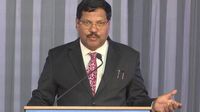Justice Bhushan Ramkrishna Gavai is set to take over as the next Chief Justice of India (CJI) on May 14, 2025, following the retirement of the current CJI, Sanjiv Khanna, on May 13. Justice Gavai, who is the senior-most judge in the Supreme Court after Justice Khanna, was recommended for the position by Khanna in a letter to the Union Law Ministry, adhering to the traditional protocol for such appointments.
Born on November 24, 1960, in Amravati, Maharashtra, Justice Gavai joined the Bar on March 16, 1985, and began his legal career under the mentorship of the late Raja S. Bhonsale, a former Advocate General and High Court judge. He initially practiced independently at the Bombay High Court starting in 1987, focusing primarily on Constitutional and Administrative Law.
Over the years, Justice Gavai represented several public bodies, including the Municipal Corporations of Nagpur and Amravati, as well as Amravati University. His legal expertise led to his appointment as Assistant Government Pleader and Additional Public Prosecutor at the Nagpur Bench of the Bombay High Court in August 1992, and later as Government Pleader and Public Prosecutor in 2000.
Justice Gavai was appointed as an Additional Judge of the Bombay High Court on November 14, 2003, and became a permanent judge on November 12, 2005. His elevation to the Supreme Court occurred on May 24, 2019, where he has since participated in several landmark rulings.
Among his notable contributions, Justice Gavai was part of the five-judge Constitution bench that unanimously upheld the Centre's decision to abrogate Article 370 in December 2023, which previously granted special status to Jammu and Kashmir. He also played a crucial role in another five-judge bench that struck down the controversial electoral bonds scheme used for political funding.
In a significant ruling, Justice Gavai was part of the bench that, by a 4:1 majority, approved the Centre's 2016 demonetisation of ₹500 and ₹1,000 currency notes. Additionally, he was involved in a seven-judge Constitution bench that ruled, by a 6:1 majority, that states have the constitutional authority to create sub-classifications within Scheduled Castes to provide targeted reservation for the most backward among them.
Justice Gavai's tenure as CJI will last until his retirement on November 23, 2025, making him the 52nd Chief Justice of India. His appointment is particularly noteworthy as he will be the second Dalit to hold this prestigious position, following Justice K.G. Balakrishnan, who served as CJI from 2007 to 2010.
As he prepares to take office, Justice Gavai is expected to continue addressing significant legal issues that affect the nation, including matters related to constitutional law and public policy. His commitment to upholding the rule of law and ensuring justice for all will be closely watched by legal experts and the public alike.
Justice Gavai has laid down important guidelines during his time in the Supreme Court, including a ruling that mandates no property should be demolished without a prior showcause notice, allowing affected individuals 15 days to respond. This decision reflects his dedication to safeguarding citizens' rights and ensuring due process.
As he steps into this new role, Justice Gavai faces the challenge of leading the judiciary during a time of significant legal and societal changes in India. His background, extensive experience, and judicial philosophy will play a critical role in shaping the future of the Supreme Court and its impact on Indian society.
Justice Gavai's appointment marks a new chapter in the Indian judiciary, and as he prepares to take the oath of office, many are hopeful that he will bring a fresh perspective to the challenges facing the nation's highest court.









